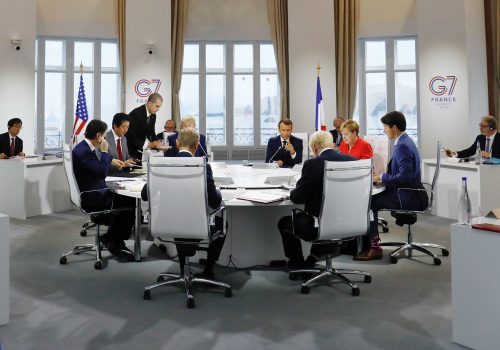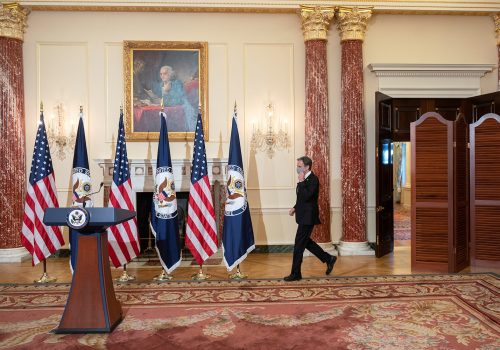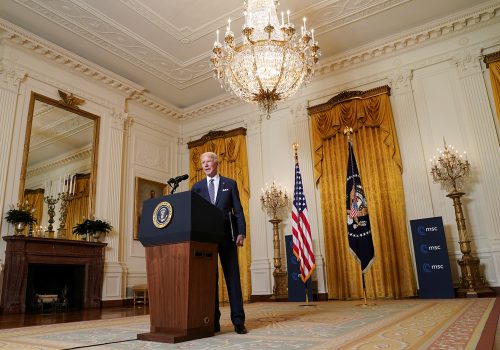Biden is building a doctrine around democracy. Will it work?
“There will be no doubt about the resolve of the US to defend our democratic values, which we cannot separate from our interests.”
In his Washington Post essay on June 5, US President Joe Biden sketched out what could become a doctrine for his foreign policy: The United States will rally the world’s democracies to deliver results for their peoples and the world—and thus better contend with the world’s authoritarians, starting with China and Russia.
If he means it, it’s a big deal. Biden is breaking not just with the Trump administration’s framework of great-power rivalry but also with Barack Obama’s reserve about putting the United States behind democracy as a core value. Biden seems to want to refashion for today’s challenges an American grand strategy that started with Teddy Roosevelt, found expression in Woodrow Wilson’s Fourteen Points of 1918, and was put to work by Franklin Roosevelt and Harry Truman after World War II. It’s a strategy rooted in confidence that a rules-based international system that favors freedom will be good for both the United States and the world; that US interests will advance with its values; that US prosperity depends on the prosperity of others; and, therefore, that US support for and leadership of such a world—the “free world,” as we used to say—is not charity but wise self-interest.
A pro-democracy strategy represents an old American faith in progress. It represents a sense that the world is not zero-sum, where powers are pitted against each other over who gets what from a limited pot and the United States gains only if others lose. It represents self-confidence that Americans’ entrepreneurship and creativity—Yankee ingenuity—gives the United States a natural advantage in an open, rules-based world. It represents a break from what used to be the norm in international relations and made a comeback under Donald Trump—competing empires and spheres of influence that leaders like Russian President Vladimir Putin seem to yearn for—in favor of a bigger vision that seeks an undivided world.
It’s a compelling vision. But achieving it will be fraught. As the United States has discovered many times, big plans have a way of breaking down when they meet messy reality. Biden’s will be no exception. No strategy guarantees protection against folly in its implementation. Truman’s strategy of containment was intended to defend freedom against Stalinist aggression and terror. In the end, it worked. But for many years it was invoked to justify a whole series of blunders and hypocrisies, the Vietnam War among them.
We can, in fact, already see that policy-meets-reality clash. Biden’s op-ed promises resistance to Putin’s aggression, including against Ukraine. But the Biden administration has struggled to find a way to contend with Putin’s Nord Stream 2 gas pipeline project from Russia to Germany that, as Putin just threatened, will give him the ability to cut off gas supplies to Ukraine unless it shows greater deference to him. The Biden administration has announced that it seeks greater predictability and stability in relations with Russia. But in recent weeks Russia-based hackers have attacked US infrastructure (the critical Colonial Pipeline and the JBS meat-packing plant) and Russian intelligence services reportedly hacked into a USAID account to carry out a phishing attack; and this is after the Biden administration imposed sanctions following the SolarWinds hack by Russian intelligence. Putin seems to place little value on predictability and stability in relations with the United States.
Biden’s op-ed calls on the United States and European Union to focus on “ensuring that market democracies, not China or anyone else, write the twenty-first-century rules around trade and technology.” That’s laudable, and the ex-National Security Council staffer in me recognizes the temptation to “ensure” some outcome. But history warns us that policymakers can’t ensure much of anything. The effort to rally Europe to strengthen rules and norms that limit the reach of Russian corruption and disinformation, or China’s exploitation of the international trading system, will run up against long-standing differences between the United States and Europe over trade, technology, and taxes.
Then there are those across the US political spectrum who may recoil from Biden’s expansive vision. The United States, so their argument goes, should pull back from its global engagements, limit its ambitions, and focus on problems at home. They contend that a divided nation with its own democracy in question has no business talking about democracy in the rest of the world, which would amount to mere cant or nostalgia for a lost era.
These are all fair cautionary notes. They’ve all been made before, too. In response to earlier US assertions of forward-leaning strategy, and in reaction to failures and setbacks from Vietnam to Iraq, many urged US retrenchment and a focus on domestic challenges. Such critics have a point when they advocate realism about what the United States can achieve, about the need to resist impatience and avoid hubris, about the dangers of overconfidence mixed with ignorance of local conditions.
And yet.
Consider the results of the earlier versions of the forward-leaning strategy that Biden proposes in his op-ed. For all the failures of US grand strategy from FDR and Truman through Ronald Reagan to the present, US leadership looks pretty good—especially when set not against perfection or extravagant US rhetoric, but against the competition. In the twentieth century that competition was Communism, Nazism, militarism, and European empires. In the twenty-first century, it’s Putin’s Russia or Xi Jinping’s China.
Biden is right to urge a big, values-based vision for the United States. He’s right because US prosperity and freedom will not flourish in a world divided between rival empires headed by tyrants, where the rules and norms are set in Beijing and Moscow. He’s right because US retreat now will vindicate the authoritarians in their view that democracy is in decline and the future belongs to them.
Realism and restraint are critical operational guidelines. But they are not a substitute for a larger strategy. They are not an adequate response to those who still look to the United States for leadership based on democratic values. Don’t do stupid stuff, as Obama observed. But try to do the bigger things as best you can, as hard as that always is.
Daniel Fried is the Weiser Family distinguished fellow at the Atlantic Council. He was the coordinator for sanctions policy during the Obama administration, assistant secretary of State for Europe and Eurasia during the Bush administration, and senior director at the National Security Council for the Clinton and Bush administrations. He also served as ambassador to Poland during the Clinton administration. Follow him on Twitter @AmbDanFried.
Further reading
Image: The president of the United States, Joe Biden, begins this week his first official visit abroad since arriving at the White House, a European tour during which he will take part in G7, NATO, and European Union (EU) summits before a meeting with his Russian counterpart Vladimir Poutin on June 16 in Geneva. Photo taken on June 1, 2021 by Carlos Barria via REUTERS.


